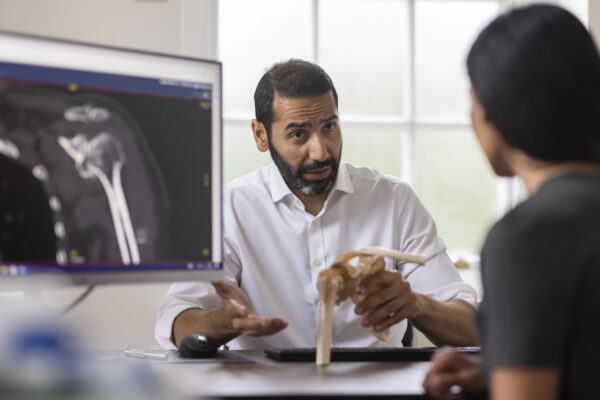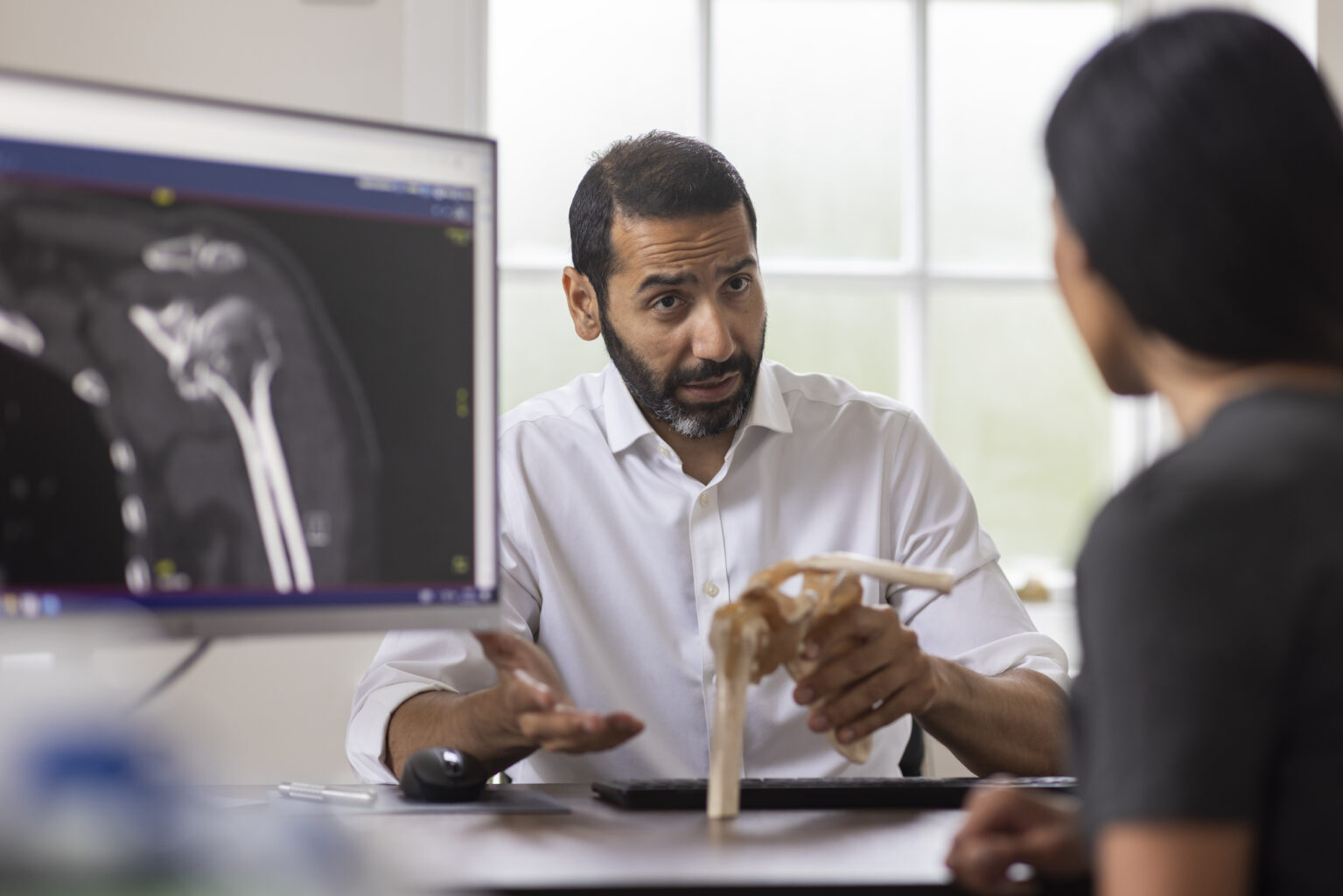Contact number: 020 7806 4060
What is Shoulder Replacement Surgery?
Shoulder replacement surgery involves removing damaged parts of the shoulder joint and replacing them with artificial implants made of metal, plastic, or ceramic. This procedure is typically recommended for patients with advanced arthritis, rotator cuff injuries, or fractures that cause chronic pain and limit movement.
Depending on the patient’s condition, the surgery may involve:
- Total Shoulder Replacement: Replacing the entire ball-and-socket joint.
- Partial Shoulder Replacement: Replacing only the damaged ball (humeral head).
- Reverse Shoulder Replacement: For cases involving severe rotator cuff damage, this reverses the ball-and-socket structure for better function.
Located in St John’s Wood (NW8), our hospital offers modern facilities and compassionate care to support patients throughout their treatment journey.
Shoulder Replacement Surgery at St John & St Elizabeth Hospital
At St John & St Elizabeth Hospital, we provide expert shoulder replacement surgery tailored to each patient’s needs. Our orthopaedic specialists are dedicated to helping you achieve lasting relief and a return to daily activities.
Why choose us for shoulder replacement surgery?
- Specialist Surgeons: Our consultants are highly experienced in performing all types of shoulder replacement surgeries.
- Advanced Techniques: We use the latest surgical methods to enhance outcomes and minimise recovery time.
- Comprehensive Care: From diagnosis to post-operative rehabilitation, we provide support at every stage.
- Accessible Location: Conveniently based in NW8, we serve patients from Hampstead (NW3), Kilburn (NW6), and the wider London area.
We are committed to helping you regain mobility and improve your quality of life with expert and compassionate care.
How Much Does A Private Shoulder Replacement Surgery Cost?
from £12,070*
The price shown includes all costs associated with your treatment, from admission to discharge. Doesn’t include surgeon or anaesthetist fee. Our hospital fee is guaranteed at the price quoted and valid for one month from the date issued, subject to pre-assessment.
| The cost of a private shoulder replacement is £12,070 at St John & St Elizabeth Hospital. |
| The cost of a private reverse shoulder replacement is £14,955 at St John & St Elizabeth Hospital. |
How to pay for your treatment
If you’re… paying for yourself
Did you know you don’t need private medical insurance to come to St John & St Elizabeth Hospital? As a self-pay patient, you can access safe, outstanding quality health care at times to suit you.
For scans and tests, as well as to see most consultants, you’ll still need to be referred by a medical professional like your GP, but as a self-pay patient, the process is more straightforward. You won’t need authorisation from an insurance provider, and you’ll have greater choice of consultant and appointment times.
If you’re… insured
St John & St Elizabeth Hospital is approved by all major medical insurance companies. If you have a personal private health insurance policy, or your company provide it for you, you can use it to pay for your care from your initial consultation through to treatment, surgery and aftercare such as physiotherapy. Not all private health insurance plans cover the same things. It’s very important to check exactly what you are covered for with your insurance provider.
Consultants who perform Shoulder Replacement Surgery in London
Appointment
Your journey begins with a detailed consultation to discuss your goals and determine your suitability for shoulder replacement.
Treatment Plan
A tailored treatment plan will be developed based on your consultation, outlining the specifics of your procedure and recovery plan. Depending on the extent of the shoulder damage, the treatment plan may include options such as partial shoulder replacement.
Pre-Procedure Assessment
A thorough pre-procedure assessment ensures you are fit for surgery, involving necessary tests to uphold the highest standards of care and safety.
The Procedure
Performed by our skilled medical team, the surgery will focus on achieving the best possible outcomes for your shoulder replacement. The procedure may involve techniques such as reverse shoulder replacement, especially in cases where the rotator cuff is damaged.
Aftercare and Recovery
Post-procedure, you will receive detailed aftercare instructions and have follow-up appointments to support your recovery and ensure the best results.
Frequently Asked Questions About Shoulder Replacement Surgery
St John & St Elizabeth Hospital is located in St John’s Wood (NW8), a well-connected area of North West London. We are conveniently accessible for patients from Hampstead (NW3), Kilburn (NW6), and beyond.
By Tube:
- St John’s Wood station (Jubilee Line) is just a 5-minute walk from the hospital.
- Finchley Road (NW3) and Kilburn stations (NW6) on the Jubilee Line provide excellent connections.
By Bus:
- Wellington Road: Routes 13, 46, 82, and 113 stop near St John’s Wood Underground Station, just a short walk from the hospital.
- Circus Road: Routes 46 and 187 stop close to the hospital’s Circus Road entrance.
- Abbey Road: Routes 139 and 189 stop near the junction where Grove End Road becomes Abbey Road, providing easy access.
Major Roads:
If you’re travelling from NW3 or NW6, major routes such as Finchley Road or Kilburn High Road offer a direct approach to the hospital.
Our hospital ensures convenient access for patients across London, particularly those in NW8, NW3, and NW6 postcodes.
Shoulder replacement surgery is highly effective for relieving chronic pain, restoring mobility, and improving quality of life for patients with severe joint damage. It is particularly beneficial for those who have not responded to non-surgical treatments such as physiotherapy or medication.
Most patients stay in the hospital for one to two nights after shoulder replacement surgery for monitoring and initial recovery. In some cases, it may be possible to go home the same day if the procedure is straightforward and support is available at home.
Immediate Post-Op Care
Managing post-operative effects such as swelling, bruising, and discomfort is crucial. Our team will provide you with pain management strategies and detailed care instructions. Physical therapy will focus on strengthening the rotator cuff muscles to support the shoulder joint and improve recovery. Physical therapy is often recommended to help regain strength and flexibility in the shoulder.
Follow-Up Care and Physical Therapy for Shoulder Replacement
Regular follow-up appointments will be scheduled to monitor your recovery and assess the success of the surgery. These visits are essential to address any concerns and ensure optimal recovery.
Key benefits of shoulder replacement include:
- Pain Relief: Significant reduction or elimination of shoulder pain.
- Improved Mobility: Enhanced range of motion and shoulder function.
- Quality of Life: Improved ability to perform daily activities and enjoy a better overall quality of life.
Medically reviewed by Mr Abbas Rashid - BSc(Hons) MBBS FRCS(Tr&Orth) on 26/04/2024


